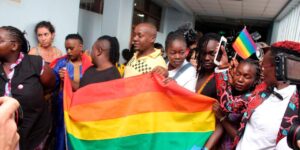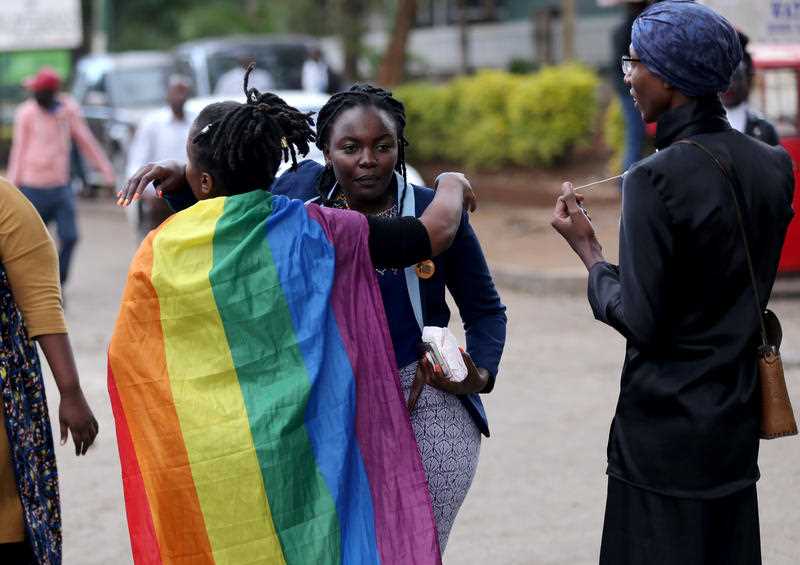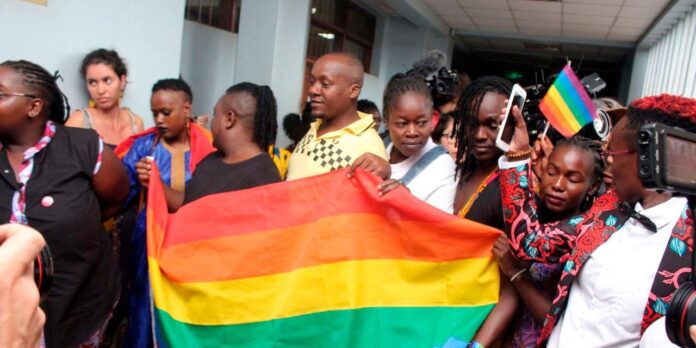By Doris Kathia
Nairobi, Kenya: After a horrifying experience of sexual assault, Fahe, a young individual who identifies as queer and stands as a courageous advocate for the LBQ community, found themselves facing an unexpected pregnancy and an urgent need for safe abortion services.
When they reached out to a local healthcare provider for assistance, the response they received was far from supportive. Fahe recounts the distressing encounter, “The first question I was asked was, ‘Who is the owner of the pregnancy?'” The trauma and insensitivity of this question compelled them to leave the facility, leaving them burdened with an unwanted pregnancy for weeks. This experience highlights a glaring issue – the lack of understanding and empathy within healthcare services towards the LBQ community.
However, Fahe’s ordeal did not end there. They had to seek the services of a private medical institution. “I had the privilege of having resources, and in this case, just basically money because I remember, I paid 30,000 shillings to get that kind of service from Marie Stopes.” It was a privilege afforded to them by their financial capability, and a stark reminder that not all LBQ women can access or afford such services.
According to Article 26(4) of the constitution of Kenya, abortion is restricted – not outrightly illegal – in the country and can be provided under certain circumstances including, if in the opinion of a trained health professional, there is a need for emergency treatment, in the event of rape, or the life or health of the mother is in danger, or if permitted by any other written law.
In a case of rape, both heterosexual women and queer persons are entitled to access abortion services without any form of discrimination if the healthcare providers make a decision that the mental health of the person seeking the services qualifies them to do so. In Fahe’s case, they sought the abortion because of the trauma of what they had been through.
According to a 2019 report by the National Gay and Lesbian Human Rights Commission (NGLHRC), 45% of LBQ women in Kenya reported having experienced stigma or discrimination when seeking healthcare services. Additionally, 55% of respondents reported that they did not have access to inclusive or affirming healthcare providers. Guttmacher Institute estimated that 464,690 induced abortions occurred in Kenya in 2012, with 119,000 women experiencing complications from unsafe abortions.
In Kenya, the LGBTQ+ community battles an array of societal issues, and their real medical needs are often lost in a sea of misinformation and prejudice. LBQ (lesbian, bisexual, and queer) women in Kenya face a myriad of challenges in accessing healthcare services, in many cases simply reduced to their sexual orientation, facing a climate of intimidation and lack of care even from healthcare providers.

While it may be assumed that all women have access to contraceptive options, the reality for LBQ women is quite different. These women face a lack of tailored services due to the historical neglect of sexual orientation and gender identity in service provision. Fahe, an eloquent voice for the LBQ community, confirmed that is not an assumption but a regrettable reality. Their words painted a stark picture, “Traditionally, there’s not been any focus in terms of segregation of women in terms of sexual orientation or gender identity that would enable ease of access to services.”
The consequences of this neglect are dire, with LBQ women facing stigma, discrimination, and a lack of essential services. Restrictive laws further compound the issue, as policies and guidelines fail to address the specific needs of the LBQ community.
The illegality of homosexuality denies LBQ women their right to these services but also erases their existence from official data. These laws leave LBQ women in a precarious position, often pushing them into the shadows, where their existence and needs remain unacknowledged and hence, unmet. As a result, LBQ women are often forced to conceal their sexual orientation, further marginalizing them.

Qario, a queer woman, shares their experience, stating, “Some LBQ women need contraceptives, not just for family planning, but also to manage severe cramps caused by conditions like endometriosis.”
Fahe confirms this, saying that trans women often need affirming care health services, but such services are rarely available. “Even basic contraception options are not packaged to address the unique needs of LBQ women, such as those experiencing issues with their menstrual cycles. Additionally, information and education on sexual and reproductive health that caters to the queer community are severely lacking.”
The consequences of this negligence are far-reaching. LBQ women are left feeling excluded and stigmatized, leading to low uptake of services. Healthcare providers, despite their training, often lack awareness and sensitivity towards LBQ individuals, resulting in traumatic experiences for those seeking care. Instead of leaving facilities feeling supported and empowered, LBQ women often leave feeling marginalized and reluctant to return.
One of the most concerning aspects of seeking SRHR services for LBQ individuals is the risk of being outed. Masculine-presenting women and those on the journey of transitioning are particularly vulnerable to being exposed.
The fear of being outed can deter individuals from seeking services, leading to untreated infections and increased transmissions. The consequences are severe and multi-layered, including physical health issues, mental health problems, and a detrimental impact on HIV treatment literacy among the LBQ community. This creates a cycle of health risks that, if not addressed, can lead to the loss of lives if they end up being attacked.
Healthcare providers, sometimes unaware of the identities and experiences of LBQ individuals, may ask intrusive questions or make assumptions that further perpetuate the feeling of exclusion. This not only deters LBQ women from seeking services but also puts them at a higher risk of untreated infections and transmission of diseases and potentially life-threatening complications.
Qario shares the story of a friend who, while attempting to access HIV testing, was interrogated about their sexual activity and partner. The healthcare provider’s refusal to acknowledge their same-sex relationship led to their outing, resulting in threats to their safety and forcing them to relocate. “The consequences are grave,” Qario said. “It leads to homelessness, mental health problems such as depression, and even correction or conversion therapy.”
LBQ women are vulnerable to sexual assault and rape as a result of family plans to ‘correct’ their sexual orientation. Family members or close acquaintances organize these forms of sexual violence, assuming that their sexual orientation itself is a disease and once you are raped it will make you ‘straight’. These cases are rife with underreporting due to fear of victim-blaming and outing. LBQ women find themselves trapped in a horrific cycle of abuse and silence, their voices muted by societal prejudice and stigma.
Fahe notes, “What homophobia and stigma do is ensure that they do not go for treatment. For example, if a person experiences this kind of rape but fears the stigma attached to their sexual orientation, they may hesitate to seek immediate medical attention, increasing the risk of HIV transmission.”
When it comes to HIV information access and treatment, many healthcare providers portray their ignorance, particularly on LBQ women. A 2018 study by NGLHRC found that 15.4% of LBQ women in Kenya had been diagnosed with HIV, compared to 4.9% of the general population. Further, 36% of LBQ women reported experiencing physical violence from a healthcare provider, and 70% reported experiencing discrimination or stigma. This can make it difficult for LBQ women to feel safe seeking out HIV services.
Rachel, a masculine-presenting LBQ woman, shares her deep sense of frustration and indignation while arguing that misconceptions about LBQ women’s sexual experiences often result in fewer contraceptive options for this group. “The notion that LBQ women cannot get STIs and they don’t need to prevent themselves from anything has led to an assumption of safety that doesn’t exist.”
The consequences of these misconceptions and lack of information are dire. Rackel recounts the story of a friend, a masculine-presenting woman who sought HIV testing. Their experience was marred by a healthcare provider’s ignorance, leading to them being denied services and subsequently, being outed. “My friend couldn’t believe her ears,” Rackel said. “The nurse blatantly told her, ‘I thought queer people don’t get infected with HIV and STIs. Why do you want to be tested?’ It was a shocking display of ignorance and discrimination.”
LBQ women, like all women, face risks such as sexually transmitted infections, HIV, and unwanted pregnancies. Rackel stresses that “We have the same SRHR needs as heterosexual women,” In fact, Rackel points out that LBQ women often engage in risky behaviour, such as sharing sex toys without proper sterilization. The lack of understanding of the varied sexual experiences of LBQ women leads to an ignorance of their unique sexual and reproductive health needs such as protection during sexual encounters. The fallout? An increased risk of STI and HIV infections due to a lack of information and provision of safe sex products.
According to a study published in the Journal of Sexually Transmitted Infections in 2022, LBQ women are three times more likely to contract STIs than heterosexual women, reinforcing the urgent need for tailored information and services. According to a study by the National Network of People Living with HIV/AIDS in Kenya (NEPHAK), stigma and discrimination towards lesbians in Kenya is estimated at 32.01%, On the other hand, the Kenya Stigma Index Survey 2013 shows that the general HIV stigma and discrimination is at 45%. High HIV stigma and discrimination have compromised individuals’ efforts to access health care. The data, however, is scarce for LBQ women, indicating an urgent need for targeted research and interventions.
Adding to the healthcare crisis faced by the LBQ community is the prevalence of homophobia. According to a report by the National Gay and Lesbian Human Rights Commission, 89% of LGBTQ+ individuals in Kenya have experienced violence or discrimination. Moreover, 73% of those surveyed reported avoiding seeking healthcare due to fear of being discriminated against. These numbers are not just statistics; they represent real people with real experiences, like Qario, Fahe, and Rackel.
“If you experience homophobia in a healthcare facility, where are you going to get services?” Qario questions, underlining the grim reality they face. They point out that many LBQ women refrain from seeking medical help due to the potential breach of privacy, emphasising the need for a responsive and responsible sexual and reproductive health rights (SRHR) system that accommodates everyone, regardless of their sexual orientation or gender. “We need a healthcare system that caters to all needs of all persons,” they state.
When asked why people should care about the LBQ and the wider queer community, Rackel gives a compelling answer. “Society should care about this issue because queer individuals are human beings, integral parts of society. They are siblings, neighbours, friends, and sometimes parents. They are people first, defined by more than just their sexuality.”
Qario’s response is simple yet profound. “The only reason I think they should care is that we are human… we are also taxpayers apart from being queer… We are contributing so much to the country. We also have skilled queer persons including doctors, so that aspect of being human, why not be human? Let’s just be human to each and every person.”
According to Human Rights Watch, Kenya is one of the 68 countries where homosexuality remains criminalized. This legal status contributes to the climate of fear and discrimination faced by queer individuals. They highlight the urgent need to humanize queer individuals, move beyond stereotypes, and foster empathy. As Rackel so eloquently puts it, “Queer love language is unique. It’s time that society learns to speak it.”
According to Fahe, a responsive and responsible SRHR system should be inclusive and diverse. One place for that battle to start is by challenging the legal structures that explicitly marginalize the LBQ community – Sections 162 and 165 of the penal code, which criminalize homosexuality.
In the face of these systemic issues, Qario and many others in the LBQ community have developed strategies to protect their identities and navigate these challenges. “For me, I’m very cautious of my safety and places I go to… homophobic people will always be there… Even if I want to come out or I’m living my authentic life I know there are places where I’m supposed to act in a certain way for my own safety.”
These issues matter. Qario’s plea to “just be human” is more than a call for acceptance. It is a demand for equality, a cry for justice, and a testament to the resilience of a community often pushed to the margins. The reasons for their choices, their fears, and their struggle for acceptance should not be reduced to their sexual orientation. They are, after all, more than the labels society places on them.
These experiences underline the urgent need for change. It’s not just about providing services; it’s about safeguarding dignity, security, and life itself.
“This story was written and produced as part of a media skills development program delivered by Thomson Reuters Foundation. The content is the sole responsibility of the author and the publisher.”
Editor: Christine Mungai














